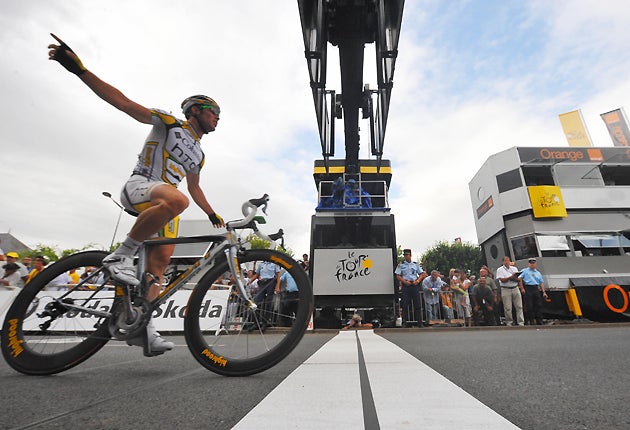Briton wins a third stage in Tour de France

Your support helps us to tell the story
From reproductive rights to climate change to Big Tech, The Independent is on the ground when the story is developing. Whether it's investigating the financials of Elon Musk's pro-Trump PAC or producing our latest documentary, 'The A Word', which shines a light on the American women fighting for reproductive rights, we know how important it is to parse out the facts from the messaging.
At such a critical moment in US history, we need reporters on the ground. Your donation allows us to keep sending journalists to speak to both sides of the story.
The Independent is trusted by Americans across the entire political spectrum. And unlike many other quality news outlets, we choose not to lock Americans out of our reporting and analysis with paywalls. We believe quality journalism should be available to everyone, paid for by those who can afford it.
Your support makes all the difference.Mark Cavendish won the 10th stage of the Tour de France today, narrowly beating Thor Hushovd in a sprint finish on a flat stage that had cyclists riding without earpieces.
The British sprinter earned his third stage win of the Tour by breaking ahead in the final 200 meters (yards) and holding off a late charge from Hushovd. Tyler Farrar of the United States finished third.
"It was a really hard finish, slightly uphill with a lot of corners," Cavendish, who rides for Team Columbia-High Road, said. "I was scared that I attacked too early but (teammate Mark) Renshaw helped me a lot."
Rinaldo Nocentini of Italy kept the race leader's yellow jersey on the 194.5-kilometer (120.9-mile) trek between Limoges and Issoudun that favored sprinters. Seven-time champion Lance Armstrong finished safely in the main pack and remains in third place, with Astana teammate Alberto Contador in second.
Nocentini joined Armstrong and other Tour riders in criticizing the decision not to race with earpieces.
"I think that for us (riders) and for the whole team it is not a good thing," Nocentini said. "We spoke about the earpieces before the start. The fact is for us it's dangerous not to have them. There are dangers on the road."
Four riders were caught late in the race following a long breakaway.
Thierry Hupond, Benoit Vaugrenard, Mikhail Ignatiev and Samuel Dumoulin were caught with about 1.4 kilometers (.87 miles) to go. Cavendish then turned into the home straight and was pressured by Hushovd, but held on for his seventh career Tour stage win.
"Cavendish is very, very fast, but it's true that he also has a very quick team," Hushovd said. "I lost four or five meters (yards) to him in the last turn."
Cavendish, who won four stages but did not finish the Tour last year, clocked a provisional winning time of 4 hours, 46 minutes, 43 seconds.
Hushovd, who kept the sprinter's green jersey despite losing points to Cavendish, and Farrar were given the same time as Cavendish.
With two more flat stages to come on Wednesday and Thursday, Cavendish has Hushovd's green jersey in his sights.
"I hope to win more (stages) in the next two days," Cavendish said.
Armstrong is coming out of 3½ years of retirement and chasing an eighth Tour title. Contador is aiming for a second title after winning in 2007. The Spanish mountain specialist was unable to defend his title last year because Astana was barred from the race because of doping scandals.
The Tour hoped to inject drama into this race by eliminating earpieces in the 10th and 13th stages. Many riders, including Armstrong and Contador, saw the measure as dangerous.
"I can't hear anything, I don't know anything. ... I feel naked," Armstrong joked as he got off his Astana team bus and mounted his bike to go to the start line. "I think it's a lot to do about nothing."
Astana team director Johan Bruyneel had campaigned for the ban to be overturned. But it was upheld and is also scheduled for Friday, a tricky stage featuring one big climb and possibly many attacks. Teams are still pressuring organizers to overturn the ban.
"My impression is that we'll have the radio on Friday," Armstrong said.
With the backing of the cycling's governing body, Tour organizers decided last month that rider radios and TV sets in cars would be banned for the 10th and 13th stages. Earlier in the race, Bruyneel said the Tour was "not the place to have an experiment" of this kind.
Earpieces allow riders to be linked to their directors in the team cars. Popularized by Armstrong when he won his first Tour in 1999, some riders and former champions have recently criticized them for making the sport too clinical.
Riders can be informed of developments and told when they need to attack or chase riders in a breakaway.
"There are arguments to both sides, to have them or not to have them. But on balance, I think it's better to have them," Armstrong said. "In cycling, we have other, more important, things to care about."
Join our commenting forum
Join thought-provoking conversations, follow other Independent readers and see their replies
Comments